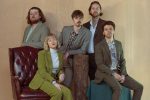An Interview with Laura Marling
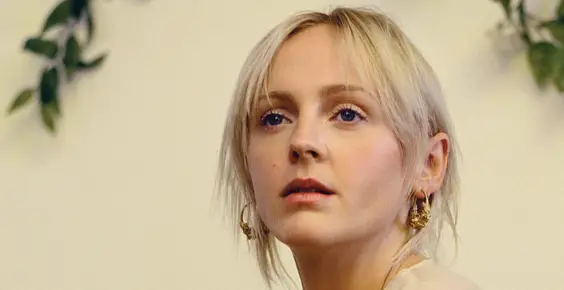
Singer-songwriter Laura Marling discusses her album, Semper Femina, the creative process, LA living, life without music and her literary influences…
Where does the name of your album Semper Femina come from?
The title comes from a Virgil poem, and the full quote from the poem is “Varium et mutabile semper femina”, which I might be pronouncing wrong but the translation is: “fickle and changeable, always a woman”. So it’s better off as just “always a woman”.
You’ve said that the album came from a particularly “masculine time” in your life and that you approached the album as if you were a man writing about a woman but then realised that you didn’t need to write it from a man’s perspective. How did those feelings inform the songs on the record?
We’re somewhat accustomed to seeing women through men’s eyes. Naturally it was my inclination to try and take some power over that, but very quickly realised that the powerful thing to do was to look at women through a woman’s eyes. It was a little stumble at the beginning of the record, a self conscious stumble – but yes that’s where that came from.
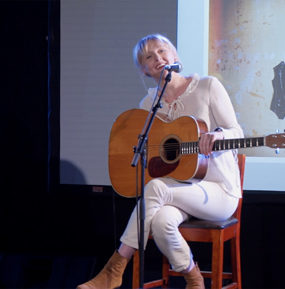 “I like delving into poetry”
“I like delving into poetry”
Your lyrics are always so romantic and literary. I was wondering whether you draw any inspiration from literary fiction as well as music. If so who or what?
I used to read a lot of fiction and I don’t any more, but I read a lot poetry. So Gothic Romantic literature used to play quite a big part in my vocabulary of emotional experience. Now that I have my own emotional experiences, many of them, I like drawing on them and delving into poetry more, as well as literary fictional/fantasy.
My favourite poet is Rainer Maria Rilke – who was a bit of a hopeless romantic. He’s the reason that I got to writing this record in some ways because I was researching his life for writing the libretto for an opera. He was dressed as a girl until he was eight, which had quite a profound effect on his relationship to women and made him somewhat of an obsessive woman-fancier. It was his misguided perception of femininity that led me to try and investigate more about that.
How did you find the creative process of directing a video as opposed to songwriting. Was it challenging? Did you enjoy it? Would you do it again?
I’m more comfortable talking about the directing than I am the music, which is weird. The directing was amazing. I don’t often get the opportunity, or I’ve never been inclined to give visual representation to my music personally.
“I found it quite stressful, but that’s in my nature”
It’s become the way that music is released now to have a visual accompaniment. And so to give my lucid dreaming quality to this, which is where I get a lot of imagery from, to give that form was an amazing experience. It requires a lot of people to be in that image with you. So you have draw so many people in to that image with you. That annoying extra prop that costs lots of money, has to be there because it has symbolic value. It was fun, really fun.
Did you find it particularly challenging?
No. I found it quite stressful, but that’s in my nature. But I found it one of the more easy, creative things I’ve ever done.
Do you think you’ll do more in the future?
Yes. I would love to yes.
I really enjoyed your ‘Reversal of the Muse’ podcast series. Is this something you would be interested in revisiting?
I too enjoyed it. For my own self interest I’d like to continue having that conversation with as many people as I can. I want to go in next time with less of an agenda, because what I realised from having those conversations is that they were so much more complex and more biological than I realised.
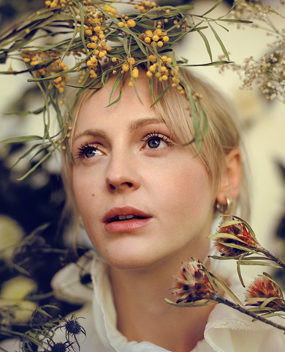 “I’ve been asked a lot to have firm opinions about femininity and feminism”
“I’ve been asked a lot to have firm opinions about femininity and feminism”
‘Reversal of the Muse’ was a series of ten conversations in podcast from about what’s happening in music and feminine creativity and it’s relationship to one another, and why there aren’t more women working in studios or more women executives and it was really interesting. Andthere’s a lot more to catch up on for women in this industry. But I’m interested to investigate other industries as well as visual art and film and television, because I think the imbalance there needs to be rectified in whatever way it can be rectified so we can have a more balanced understanding of the world, because these are the mediums by which we understand the world around us now.
Drawing on that. How do you feel your ‘Reversal of the Muse’ project has inspired your latest album and other creative works?
I started the ‘Reversal of the Muse’ before I started this record. Though my interests in femininity and the origins of that have fuelled both of these things. And whether femininity begins on a biological level or a psychological level or a emotional level or whatever and the answer is there is no answer.
I mean, there are categorical answers but there’s also lots of theoretical stuff going around that. They definitely fed into one another though in the lead up to this album. Because of its subject I’ve been asked a lot to have firm opinions about femininity and feminism and I still don’t know enough about either of those subjects to have firm opinions about them. So what I really enjoyed about the ‘Reversal of the Muse’ and its subject matter was that it allowed me to keep asking questions about these things and that’s what I want to keep doing.
“A shock to the system”
Short Movie was a glimpse into your life in LA and how you coped with that. The title Semper Femina suggests change since then. Where are your stories heading next?
So where are my stories going now? I don’t know! (*laughs*) When I wrote Short Movie it felt like I was writing about something I was going to experience rather than something I had experienced. And music has a funny way, or creativity has a funny way of being ahead of you. So I don’t know where I am now, because maybe it’s still catching up to me. I think whereas Short Movie was more based on a landscape, this album was more based in thought.
But I suppose this one was written on the road. So I guess rather than just having one home territory, one home turf to base it from, you must have been all over the globe?
Yes I was all over the shop. I suppose there’s definitely a bit of English nostalgia in there too because I was in America a lot last year and the year before last.
I was wondering about the ways in which your collaboration with producer Blake Mills have influenced you making and recording this new album. Did you approach the music making process in ways that were more exciting or different or unorthodox to you?
That’s a great question, yes. Blake Mills is an extraordinary musician and I’d become very accustomed to working with Ethan Johns who is also an extraordinary musician and we’ve made five records together. So we have a very established way of working. And working with Blake all of a sudden was quite a shock to the system because he has a very different way and he is incredibly innovative.
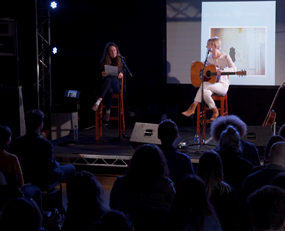 “Freedom to express myself without self criticism”
“Freedom to express myself without self criticism”
He’s not very far in age from me so we kind of met at a similar level which I’ve never experienced. I would go home every night from the studio and practice guitar because I wanted to be as good as him. Over the three weeks we were playing together my guitar playing improved a lot and he’s just someone who has spent a lot of time playing guitar and it made me think I need to spend some more time playing guitar, so that was good. He’s got an incredible tonal palette and he’s a cool cat so it was a great honour.
How do you feel that your experience of living and working in America has influenced your production and writing?
I was saying to someone earlier, I love America and find America very infuriating for the same reason. I love them because they give a lot of value to artists and everyone is an artist and that’s quite nice if you’ve devoted your career, inadvertently in my case, to being an artist. And it makes you feel good about yourself. But it also gives a very strange over the top reverence to people who have lived very self indulgent lives and demand to be called artists. And that represents my own inner tussle, a constant tussle, over whether something is an indulgence or is it a compulsion.
America gave me a bit more freedom to indulge in that compulsion to create music, funnily enough because I went there to not do that. And that’s what happened to me, I got pulled into that again. In that way it gave me a lot of freedom to express myself without self criticism that I should be doing something more important, or more useful rather.
“‘Rambling Man’ is my favourite song to play”
So you went there thinking you’d have some time out, or not write any more – maybe I’ll work on some on some podcasts and suddenly you’re landed with another album?
Yes.
Thank you America! So, aside from the Rebel Angels and The Women Who Run With The Wolves – any other notable literary influences?
Yes. I’m currently reading the diaries of Anaïs Nin at the moment and I’ve read a lot of her fiction, so that. And In that similar area Joan Didion – I’ve read lots of her stuff too. But I haven’t read any fiction for a while actually. I’ve read a lot of poetry. But if you liked Rebel Angels and The Women Who Run With The Wolves, which is funny, then I can’t recommend Lou Salome – who was a literary mentor to a lot of people enough. Any biography of hers that you can get your hands on will be of great benefit to your life.
What song of yours do you enjoy playing the most.
This is a nice question. I think the one that’s never been off the setlist – and the setlist has been going for ten years now – is ‘Rambling Man’. That’s my favourite song to play and it might be my favourite song I’ve ever written.
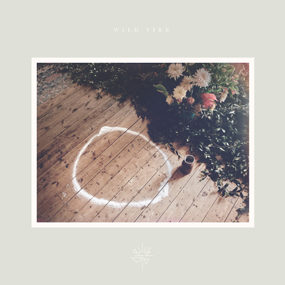 “I think I probably would have been a chef”
“I think I probably would have been a chef”
Is there any particular reason?
It’s very satisfying to sing and it’s quite fun to play.
Is that due to the muscle memory – no thought?
Yes, I’m probably playing it in my sleep now I suppose!
Do you ever think about what your life would have been if you hadn’t been a musician? Do you have another dream life or career?
Yes, I think about that constantly. Right now more than ever! Yes I do think what my life would be like without music. I think I would have always had music in my life, but I think I probably would have been a chef or a writer. Hopefully, or maybe not.
“I have this great fear of travelling alone now”
Are you good in the kitchen?
I could see that being a fun way to make money, if I didn’t have to be the head chef of a restaurant – that’d be scary.
Do you have a speciality? If you were trying to impress someone is there something you’d whip up in the kitchen?
Something vegan. That usually impresses people!
Now quite a broad one, but how do you feel your experiences throughout your career have shaped the writing of Semper Femina?
My experiences throughout my career? You mean in a sense my experiences of being a female in the industry? I think my experiences in that I’ve done a lot of travelling on my own and touring on my own – it can sound super romantic and glamorous, but dragging three or four guitars around and throwing them in the back of a car constantly, it’s a big mental and physical exertion and it can be a little bit scary you know.
Literally being alone, getting paid, doing all that stuff – I’m sure it’s scary for men as well, but I’ve been aware of that restriction of women travelling and that’s been the most relevant thing to me and I have this great fear of travelling alone now and I just noticed that innate sense of fear is really quite constricting. And perhaps more of an affliction to women than to men.
‘Semper Femina’ by Laura Marling is out now

